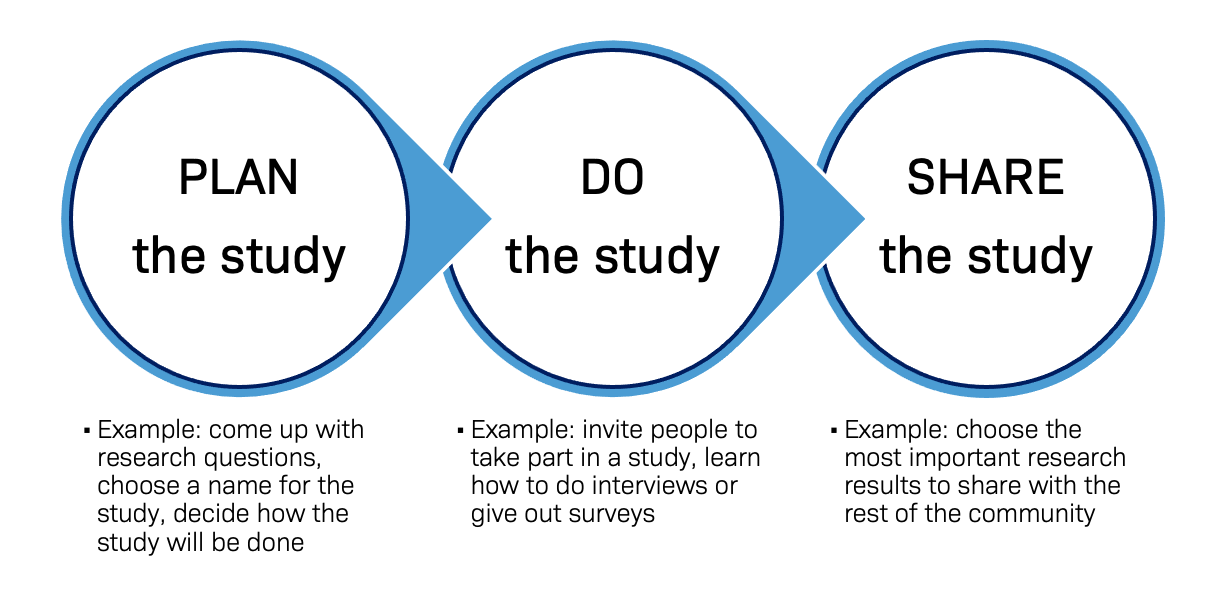
What does it mean to do research within a community?
Some researchers do studies in a lab. Some do studies in a clinic. Some do studies in hospitals. And some do studies within a community. You might be thinking, what does it mean to do research within a community? What do researchers even mean when they say “community”? Why do they want to do research with a community? How do they learn about communities? These are all great questions!
“Community” can mean a lot of different things when it comes to research. Researchers think about communities in many different ways. A community could be people who live in the same area. It could be people who are in the same age group (like children, or older adults). It could be people who share the same identities, speak the same languages, work the same jobs, experience the same health issues, join the same social media groups, enjoy doing the same activities…or people who feel connected to each other for any of these reasons, and others!
Just like there are many different types of communities, there are a lot of reasons why researchers might be interested in doing research with communities. Some researchers want to find out about how people live their lives within their communities to help improve everyday health. Some want to figure out what the most important health issues are in a community. And others want to see if a new program might help make communities healthier.
How do researchers learn about communities?
Imagine you just moved to a new town – how would you try to learn about your new home? Would you go to some events? Try to meet new people? Talk to your neighbors? Find groups that do activities you like? Now, if you were a researcher, how would you try to learn about a community you wanted to work with? If your answers seem similar, that’s because…well…they are. When researchers want to learn about communities, the best thing they can do is (you guessed it) get out there! As a researcher tries to learn more about a community, they might go to events, volunteer with community groups, or meet with people who are interested in the same health topics as they are. They might try to find out what research projects are already going on in a community by talking to other researchers. They might try to find out what health topics are most important to community members by looking at community health reports, or maybe even by trying to organize a listening session where community members come and share their thoughts and feelings about a research topic. The more time a researcher can spend learning about a community, the better their research can be! If you see a researcher out in your community before a research project starts, they might be trying to:
- Build trust and relationships with community members
- Choose a research topic that the community is interested in
- Pick a type of study that the community wants to take part in
- Learn what results community members want to see from the research
- Figure out what might make it hard for community members to join a research study and what might make it easier
- Learn if the community wants to help plan, do, or share the research
How can researchers work with a community on a research project?
One of the most important things a researcher can learn when they want to work with communities is how much a community wants to help plan, do, and share the research. Sometimes research projects happen in communities. Research that happens in communities is called community-based research. You might also think of research as happening on communities (research should not feel like it is happening on you!). Well, research can happen with communities, too. Working with communities on a research project is called community-engaged research.
Even though community-engaged research is one type of research, these projects can all look really different. There are many ways to “engage” with communities on a research project. This is why it is so important for researchers to talk with communities about how involved they want to be in planning, doing, and sharing the research. Researchers can work with community members to…

Researchers can work with communities on one part of a research project (like PLAN), or all parts of a research project (PLAN, DO, and SHARE). And sometimes researchers will work with the same communities on many different research projects! It all depends on the researcher, the study, and what the community wants.
What if researchers really want to put the community in the driver’s seat?
Sometimes, when communities are really involved with research, it is called community-based participatory research or CBPR. In community-based participatory research projects, communities aren’t just doing research with a researcher – they are leading the research! Community-based participatory research is done through a true and equal partnership of community members and a researcher or research team. The ideas, research topic, study design…pretty much everything about the research…is driven by community members. They have the power to make decisions about all parts of the study and how the research is done. Community-based participatory research studies usually try to understand big issues impacting communities (maybe something like access to healthcare or poverty within a community) and try to find solutions through policy and social change. This type of research takes a lot of time, strong relationships, and trust between community partners and researchers.
So, to wrap it all up…
There are many researchers out there who work with communities on research. Working with communities to do research takes time, trust, and effort – but it makes the research so much better for everyone!



